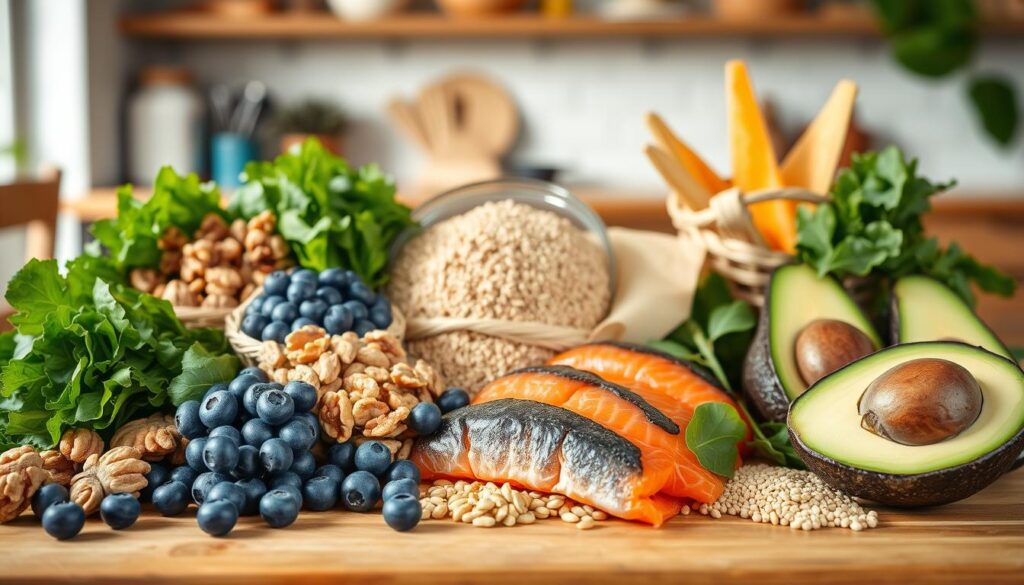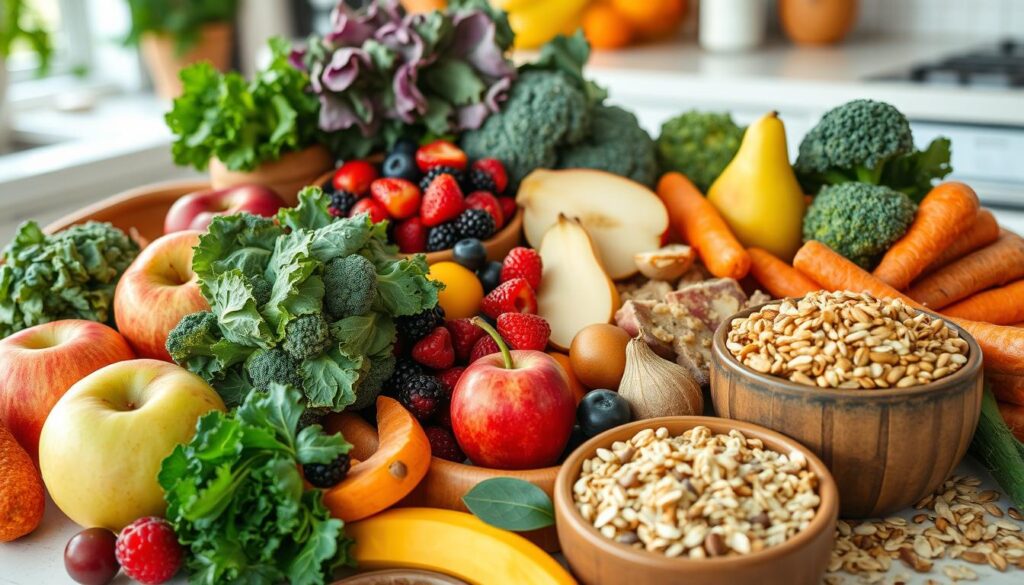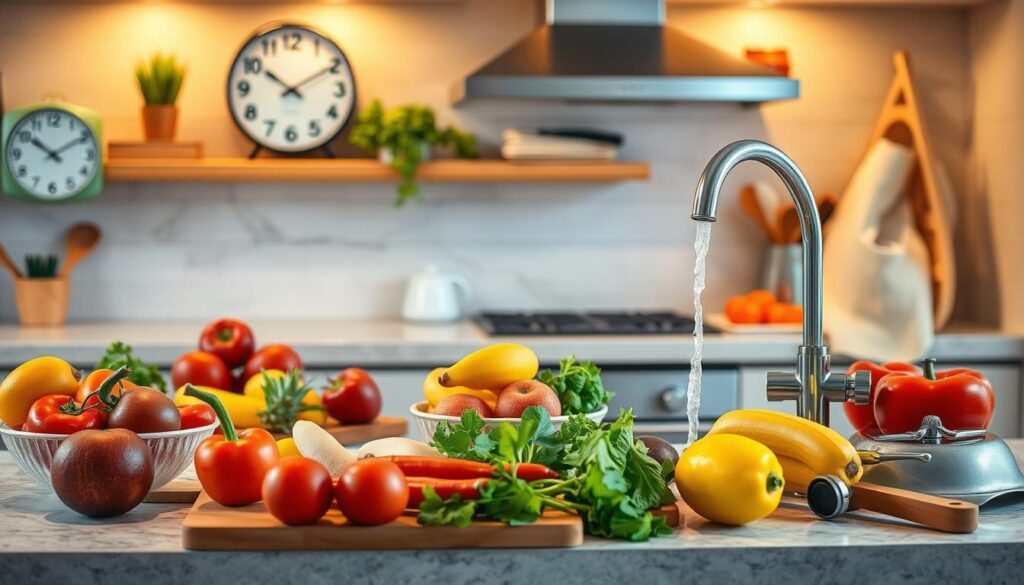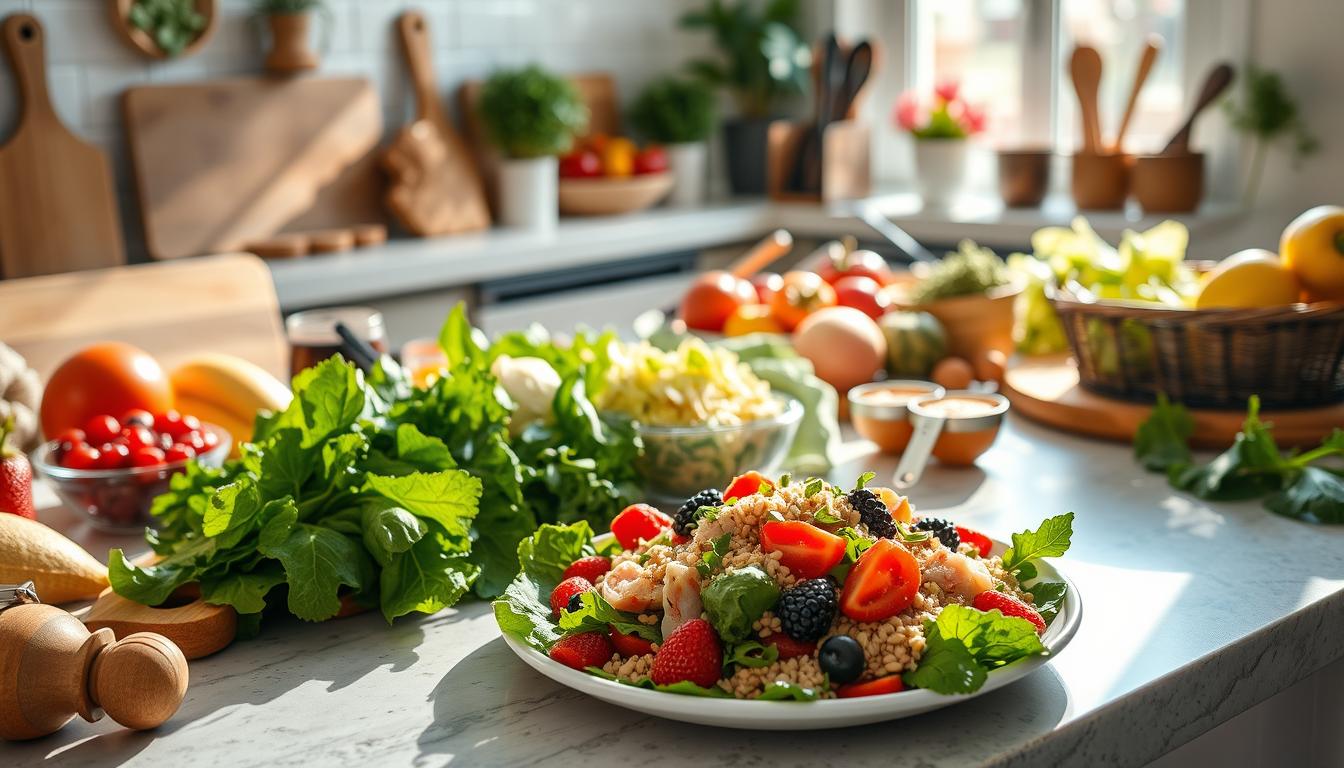Boost Senior Health as you get older by ensuriBoost Senior Health as you age by focusing on nutrient-dense foods that support your body’s changing needs.ng your body gets the right nutrients.
As we age, our bodies require different nutrients to stay healthy. This article will show you seven key recipes for seniors. These meals are specifically designed to Boost Senior Health, focusing on bone health, cognitive function, and digestive wellness.
Our easy-to-make recipes are designed to Boost Senior Health by using fresh ingredients and simple pantry items, making them perfect for seniors. This is great for seniors who don’t like cooking or have trouble in the kitchen.
Eating these meals can help manage diseases like Alzheimer’s, diabetes, heart disease, and arthritis.
Key Takeaways
- Senior nutrition is key for healthy aging and managing age-related conditions
- Essential recipes for seniors focus on bone health, memory support, and digestive wellness
- Nutrient-dense meals can help combat common health challenges in older adults
- Easy-to-prepare recipes are ideal for seniors with limited cooking abilities
- Incorporating these meals can support overall wellness and quality of life for seniors
Understanding Senior Nutrition: The Foundation of Healthy Aging
As we get older, our bodies need different foods. Senior dietary needs become more complex. It’s key to focus on nutrient-dense foods. With the global population of adults 60 and older expected to reach 2 billion by 2050, understanding these needs is more important than ever.
Boost Senior Health with Nutrient-Dense Foods for Healthy Aging
Nutrient-dense foods are packed with vitamins, minerals, and other essential nutrients without too many calories. For seniors, these foods are vital. They support immune function, maintain bone health, and boost cognitive abilities. Leafy greens, berries, whole grains, lean proteins, and fatty fish are excellent choices.
Understanding Key Nutritional Needs to Boost Senior Health and Improve Quality of Life
As metabolism slows, seniors often need fewer calories but more nutrients. Key needs include:
- Calcium and Vitamin D for bone health
- Fiber for digestive health
- Protein for muscle maintenance
- B12 for nerve function
- Omega-3 fatty acids for heart and brain health
Common Dietary Challenges in Aging
Aging nutrition challenges can make meeting these needs difficult. Decreased appetite, changes in taste, and physical limitations in food preparation are common hurdles. To overcome these:
- Eat smaller, more frequent meals
- Use herbs and spices to enhance flavor
- Choose easy-to-prepare or pre-prepared healthy options
- Stay hydrated with water-rich foods and beverages
| Challenge | Solution |
|---|---|
| Decreased appetite | Eat nutrient-dense foods in smaller portions |
| Changes in taste | Experiment with herbs and spices |
| Physical limitations | Use kitchen aids or opt for pre-cut produce |
| Reduced thirst sensation | Set reminders to drink water regularly |
By addressing these challenges and focusing on nutrient-dense foods, seniors can maintain a balanced diet for optimal health and well-being.
Boost Senior Health with the Mediterranean Diet
One of the best ways to Boost Senior Health is by adopting the Mediterranean Diet, which is rich in heart-healthy fats and brain-boosting nutrients.
The Mediterranean diet is a top choice for seniors looking to stay healthy. It’s full of fruits, veggies, and healthy fats. These foods are great for your heart and brain.
Essential Components of Mediterranean Eating
The Mediterranean diet focuses on:
- Olive oil as the main fat
- Loads of fruits and veggies
- Whole grains and legumes
- Moderate fish and poultry
- Less red meat
This diet is packed with nutrients that are key for seniors. Studies show it can cut heart disease risk by 25%.
How the Mediterranean Diet Can Boost Senior Health and Cognitive Function
The Mediterranean diet is also good for your brain. It fights oxidative stress and inflammation. This may lower the risk of cognitive decline.
Older adults who eat this way are less likely to have memory problems.
Recipe: One-Pan Mediterranean Salmon
Here’s a simple, nutritious salmon recipe that follows the Mediterranean diet:
| Ingredients | Instructions |
|---|---|
| 4 salmon fillets 1 cup cherry tomatoes 1 sliced lemon 2 tbsp olive oil 2 cloves minced garlic Fresh herbs (basil, oregano) | 1. Preheat oven to 400°F 2. Place salmon in baking dish 3. Add tomatoes and lemon slices 4. Drizzle with olive oil and add garlic 5. Bake for 15-20 minutes 6. Garnish with fresh herbs |
This meal is full of omega-3s from salmon and antioxidants from veggies and olive oil. It’s tasty and supports heart and brain health.
7 Essential Recipes for Bone Health, Memory, and Digestion in Seniors: Boost The
We’ve made seven recipes full of nutrients for seniors. These dishes help with bone health, memory, and digestion. They make a great meal plan for seniors to stay healthy.
Our recipes use ingredients rich in vitamins and minerals. They’re perfect for seniors who might have less appetite or trouble chewing. Our meals are tasty and easy to eat.
Here are our top 7 healthy recipes for seniors:
- Salmon and Quinoa Power Bowl
- Chicken and Vegetable Stir-Fry
- Vegetarian Lentil Soup
- Greek Yogurt Parfait with Berries and Nuts
- Oatmeal with Banana and Almond Butter
- Quinoa and Vegetable Stuffed Peppers
- Baked Apple with Cinnamon and Walnuts
These recipes have ingredients that help with bone strength, brain function, and digestion. For instance, the Salmon and Quinoa Power Bowl has omega-3s. These are good for the brain and memory.
The Vegetarian Lentil Soup is full of fiber for better digestion. The Greek Yogurt Parfait with Berries and Nuts is a tasty way to get more calcium for bones.
| Recipe | Health Benefits |
|---|---|
| Salmon and Quinoa Power Bowl | Brain health, memory boost |
| Vegetarian Lentil Soup | Digestive health, fiber-rich |
| Greek Yogurt Parfait | Bone health, calcium-rich |
Adding these recipes to a balanced diet helps seniors enjoy tasty meals. These meals also support their health and well-being.
Brain-Boosting MIND Diet Recipes for Seniors
The MIND diet is a powerful way to improve memory and thinking skills in seniors. It combines the best parts of the Mediterranean and DASH diets. It focuses on foods that boost brain function.

Memory-Enhancing Ingredients
The MIND diet highlights 10 key foods for the brain:
- Leafy greens
- Berries
- Nuts
- Fish rich in omega-3 fatty acids
- Whole grains
- Olive oil
- Poultry
- Beans
- Wine (in moderation)
- Dark chocolate
These foods are full of antioxidants, vitamins, and minerals. They help keep the brain healthy. Eating well may lower the risk of Alzheimer’s disease by up to a certain percentage.
Recipe: Berry-Rich Breakfast Bowl
Begin your day with this tasty MIND diet breakfast:
- Mix Greek yogurt with a handful of mixed berries
- Add a sprinkle of chopped walnuts
- Top with a drizzle of honey
- Serve with a side of whole-grain toast
Cognitive Health Benefits
The MIND diet’s focus on brain-boosting foods can lead to great results. Eating these foods regularly may slow down brain aging. It keeps the mind sharp.
By avoiding red meats, sweets, and fried foods, this diet also fights inflammation. This is key for improving memory.
Embracing the MIND diet isn’t just about what you eat; it’s about nourishing your brain for a vibrant, mentally active future.
Boost Senior Health with Anti-Inflammatory Recipes for Joint Comfort
Following an anti-inflammatory diet can greatly help with joint health and managing arthritis. It’s filled with nutrients that can ease chronic pain and boost well-being. Here are some tasty recipes that support joint health and fight inflammation.
Omega-3 fatty acids in salmon are key in fighting inflammation. A simple grilled salmon with leafy greens is a great anti-inflammatory meal. For a quick, nutritious meal, try this smoothie:
- 1 cup spinach
- 1/2 cup blueberries
- 1/2 banana
- 1 tbsp ground flaxseed
- 1 cup unsweetened almond milk
- 1/2 tsp turmeric
Turmeric is a key ingredient in anti-inflammatory diets, thanks to its curcumin. Adding it to meals can help those with arthritis. A warm broccoli cauliflower soup is also great for joint health, packed with carotenoids.
| Ingredient | Anti-Inflammatory Benefits |
|---|---|
| Salmon | High in omega-3 fatty acids |
| Turmeric | Contains curcumin, reduces inflammation |
| Blueberries | Rich in antioxidants |
| Broccoli | High in carotenoids |
Adding these anti-inflammatory foods to your diet can help with joint health and arthritis. Remember, sticking to an anti-inflammatory diet is crucial for the best results.
Boost Senior Health with Fiber-Rich Recipes for Digestive Wellness
A healthy gut is vital for overall wellness, especially for seniors. Fiber-rich foods are key for senior digestive health. They prevent constipation and feed good gut bacteria, keeping the microbiome balanced.
Importance of Gut Health in Aging
As we age, our digestive system slows down. This can cause constipation and poor nutrient absorption. Eating fiber-rich foods helps fight these issues. Whole grains, fruits, and vegetables are great sources of fiber for gut health.

Recipe: Probiotic-Rich Yogurt Parfait
Try this delicious parfait to boost your gut health:
- 1 cup Greek yogurt
- 1/4 cup mixed berries
- 2 tablespoons chia seeds
- 1 tablespoon honey
- 1/4 cup granola
Layer ingredients in a glass. The yogurt has probiotics, berries have antioxidants, and chia seeds add fiber. This tasty treat supports senior digestive health and overall well-being.
Hydration and Digestion Tips
Staying hydrated is crucial for good digestion. Aim for eight 8-ounce glasses of water daily. Include water-rich foods like cucumbers, watermelon, and tomatoes in your diet. These foods hydrate and provide essential nutrients and fiber for gut health.
“Let food be thy medicine and medicine be thy food.” – Hippocrates
Remember, a balanced diet rich in fiber and probiotics, combined with proper hydration, is the key to maintaining optimal digestive health as you age.
Boost Senior Health with Quick and Easy Recipes for Seniors
Cooking healthy meals doesn’t have to be hard for seniors. We’ve found some easy recipes and tips to help with meal prep.
Time-Saving Preparation Tips
Quick meal prep is important for seniors who want to cook on their own. Use pre-cut veggies to save time on chopping. Choose one-pan meals to cut down on cleaning.
Modified Cooking Techniques
Changing cooking methods can make cooking safer and easier for older adults. Slow cookers are great for hands-off cooking. Sheet pan recipes are simple and healthy.
Invest in kitchen tools made for seniors, like ergonomic utensils and non-slip cutting boards.
| Easy Senior Recipes | Prep Time | Cooking Method |
|---|---|---|
| Greek Yogurt Parfait | 5 minutes | No-cook |
| One-Pan Mediterranean Salmon | 10 minutes | Baked |
| Slow Cooker Vegetable Soup | 15 minutes | Slow cooker |
| Microwave Egg Scramble | 5 minutes | Microwave |
By using these quick meal prep tips and modified cooking methods, seniors can enjoy tasty, healthy meals with less effort. The main thing is to keep it simple and use nutrient-rich ingredients for the best health benefits.
Boost Senior Health with Bone-Strengthening and Calcium-Rich Meals
Strong bones are crucial for seniors to avoid fractures and stay active. Foods rich in calcium are key for bone health and preventing osteoporosis. Let’s look at tasty recipes that help strengthen bones, beyond just dairy.
Leafy greens like kale and spinach are full of vitamin K, which helps prevent osteoporosis. These greens are easy to add to many dishes. Try this calcium-rich green smoothie:
- 1 cup kale
- 1 banana
- 1/2 cup Greek yogurt
- 1 tablespoon chia seeds
- 1 cup fortified plant milk
Greek yogurt gives you 20% of your daily calcium, while chia seeds add omega-3s for heart health. Blend everything for a drink full of nutrients.
For a savory dish, try this bone-strengthening salmon and almond salad:
- 4 oz grilled salmon
- 2 cups mixed greens
- 1/4 cup sliced almonds
- 1/2 avocado, diced
- Lemon vinaigrette
Salmon is rich in protein and omega-3s, while almonds add calcium and healthy fats. This meal combines calcium sources with vitamin D-rich foods to boost bone health.
| Food | Calcium Content (mg per serving) | Other Benefits |
|---|---|---|
| Greek Yogurt (1 cup) | 230 | 17g protein, probiotics |
| Kale (1 cup, raw) | 100 | Vitamin K, antioxidants |
| Almonds (1/4 cup) | 95 | Healthy fats, vitamin E |
| Chia Seeds (1 tbsp) | 80 | Fiber, omega-3 fatty acids |
Hydration-Boosting Recipe Ideas
Staying hydrated is key for seniors, but it can be hard because they don’t feel thirsty as much. Let’s find fun ways to make drinking water more appealing and enjoyable.
Creative Water Infusions
Water infusions are a tasty way to get more fluids. Try these:
- Cucumber and mint
- Lemon and rosemary
- Strawberry and basil
- Orange and ginger
Just add these to a pitcher of water and chill it in the fridge for a few hours. You’ll get a tasty and hydrating drink that’s good for you too.
Hydrating Food Options
Adding hydrating foods to meals can help you drink more water. Here are some ideas:
| Food | Water Content | Serving Suggestion |
|---|---|---|
| Watermelon | 92% | Fresh slices or in a smoothie |
| Cucumber | 96% | In salads or as a snack |
| Broth | 92% | As a base for soups |
| Zucchini | 95% | Grilled or in pasta dishes |
These foods not only help with hydration but also give important nutrients. Adding them to meals and snacks helps seniors stay hydrated all day.
“Proper hydration is key to maintaining overall health and well-being in seniors. It’s not just about drinking water, but also about enjoying a variety of hydrating foods and beverages.”
By mixing creative water infusions with hydrating foods, seniors can drink more and enjoy a more varied diet. Remember, staying hydrated is vital for good health and avoiding dehydration problems in older adults.
Safe Food Preparation Guidelines for Seniors
Food safety is very important for seniors. As we get older, our immune systems get weaker. This makes us more likely to get sick from food. It’s crucial to prepare meals safely to avoid these problems.

Washing your hands properly is the first step in keeping food safe. Make sure to wash your hands with soap and warm water for at least 20 seconds. Do this before and after handling food. This simple step can greatly lower the chance of getting sick.
To avoid cross-contamination, use different cutting boards for raw meats and fresh produce. Clean all surfaces and tools after each use. Always use a food thermometer when cooking to make sure meats are cooked to the right temperature.
- Cook ground beef to 160°F
- Poultry should reach 165°F
- Fish should be cooked to 145°F
Storing food properly is also key. Put perishables in the fridge within two hours of cooking or buying. Keep your fridge at 40°F or below and your freezer at 0°F or below. This slows down bacterial growth.
For seniors who have trouble moving or lifting, there are easier ways to cook. Use slow cookers for simple, one-pot meals. Or, cook big batches to freeze for later. These methods help keep food safe while making sure you always have healthy meals.
Conclusion
As we finish our look at senior nutrition, it’s clear that a healthy diet is key for aging well. The number of people over 60 is set to hit 1.4 billion by 2030. This makes focusing on senior health more crucial than ever.
Our summary shows how important nutrient-rich foods are. They help fight age-related issues like anorexia, which affects up to 30% of the elderly.
We’ve looked at different diets, like the Mediterranean and MIND diets. These diets, full of fruits, veggies, whole grains, and lean proteins, boost brain and body health. Even small diet changes can make a big difference in your health.
Adding foods rich in calcium, vitamin D, B vitamins, and omega-3s is beneficial. They help with bone health, brain function, and reduce inflammation.
Drinking enough water and eating a balanced diet are essential for aging healthily. If meal prep or access to healthy foods is hard, look into meal delivery or community dining. Your nutrition journey is personal, so work with healthcare experts to make it fit your needs.
By following these dietary tips, you’re taking a big step towards a healthier, more vibrant life in your golden years.

